 |
Previous Issues |
| Cedar Mill Community Website |
|
Search the Cedar Mill News: |
About The Cedar Mill News |
|
|||||||
| Volume 9, Issue 9 | September 2011 |
||||||
|
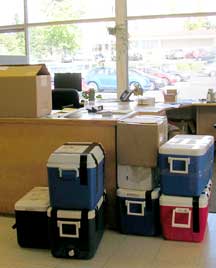 |
| Samples are shipped to them in picnic coolers |
They analyze samples for agricultural businesses, environmental consultants, state and federal agencies, local governments and land sale transactions, among others. They primarily serve customers in the northwest US, but they regularly get samples from around the globe—Guam, Oman, Hawaii. Their clients generally find them through referrals. They have a great reputation for reliability and integrity.
Food products for export are often tested to ensure that they meet foreign requirements. Most of their food testing is done for marketing purposes rather than food safety concerns. Thun says that bacterial pathogens are a much bigger food safety concern than pesticide contamination.
Thun says that the global marketplace presents problems for US farmers exporting products. Different countries have different standards for Maximum Residue Levels (MRLs) and they can be used as trade barriers. Japan, Taiwan, Korea, Australia and the European Union have some of the strictest standards.
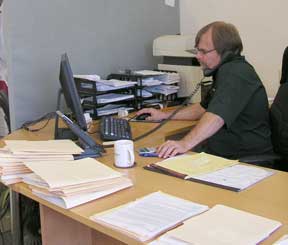 |
| Steve fields one of the many calls each day from his clients |
Some international bodies would like to harmonize the MRLs, but individual countries use them as political tools to maintain their primacy. For example, northwest cherry growers may be able to use certain chemicals on their trees for the US market, but would not be able to export the cherries to Japan or Australia. Food export brokers are the ones who keep track of all that, and they are some of PAL’s clients.
Stephen Thun graduated from the University of Oregon in 1990 with a chemistry degree. His first job, for a Japanese commodity inspection company in Portland, was doing a similar kind of analysis, and he really enjoyed it. “Each job is different and there is always a challenge,” he says.
He started Pacific Agricultural Laboratory (PAL) in 1996 at this location. Previously the Air Food and Water Analysis Company had occupied the space. That business was sold and moved away before Thun took over the space. He worked alone at first, with just a single bench. As word got around about his competence, the company grew. Dr. Wong, the dentist who had his office in the west end of the space, retired a few years ago and Thun was ready to expand, so Thun and his six employees now use the entire north side of the building.
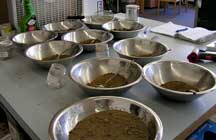 |
| Soil samples wait to be broken down during the first stage of the analysis process |
The space consists of a front office with desks for Thun and his three full-time analysts/chemists. There’s also storage space for customers’ samples, including several large home-style refrigerators. The next room back is the sample-processing area, where the three lab techs break the samples down into material that can be analyzed. Samples are primarily soil, vegetable material, and water.
Beyond that lab is the analysis area. Almost all of the work of analyzing the samples is done using highly sophisticated and computerized equipment. Once a sample is extracted from the base material, it is inserted into a Mass Spectrometer. Each chemical in the sample has a characteristic mass. The equipment is tuned to detect the pesticides they are investigating.
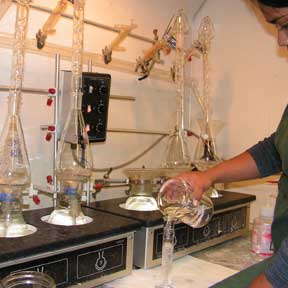 |
| Lab technician Lilly Asunama processes samples prior to analysis. She’s finishing up her chemistry degree, and enjoys being able to work in her chosen field. |
“We can’t just take a random sample of something and tell you what’s it is,” says Thun. “We are only looking at pesticides. We test the material, and let the client know if any pesticide is present, what it is, and what the concentration is.”
Some of the work that they do helps farmers solve problems. “We may get a soil sample, for example, where a farmer has done a crop rotation and the new crop isn’t doing well. We can tell him what is in his soil that could be causing the problem,” Thun explains.
The growing interest in organically grown food brings in some business, but Thun says that until recently, the organic designation hasn’t required testing. A farmer could label a crop as organically grown as long as no pesticides have been applied to his land for three years. In Oregon, Oregon Tilth is the USDA-accredited certification agency for organic products. They conduct yearly inspections of facilities to award their certification, but that doesn’t involve testing samples.
Occasionally they get a break from the agricultural testing. Every once in a while, someone comes in because they are convinced that they are being poisoned by a neighbor. “We’ve never confirmed a case like that,” says Thun. And it’s an expensive fantasy—a suite of tests can run as much as $500.
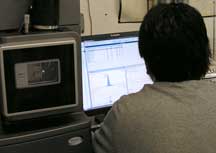 |
| The equipment on the left is a Mass Spectrometer and is their most recent acquisition, which cost $.25 million. They finance such purchases at the US Bank across the street. The graph on the computer screen shows the concentration of the chemical they’re investigating. |
Pesticide drift can be a problem too, and they can identify chemicals that land on a farmers’ field or a homeowner’s yard from a neighbor. Once in a while a neighbor will poison an offending tree overhanging their yard—that’s illegal, it’s called chemical trespass! They also helped to investigate the dog poisonings in a couple of Portland parks a few years ago.
Thun says that his success is predicated on the high quality of his employees. Rick Jordan has been his Lab Manager since 2001. All of his employees have been there for at least two years. “It takes about one year for someone to get fully up-to-speed with this work,” he says.
So now you know what they do at the Pacific Agricultural Lab. They enjoy being part of the Cedar Mill community, with its convenient services and friendly people. And Thun has nothing but praise for his landlords, Bales Findley Property Management.
Published monthly by Pioneer Marketing & Design
Publisher/Editor:Virginia Bruce
503-803-1813
PO Box 91061
Portland, Oregon 97291